Introduction: German Shepherd Dog in India
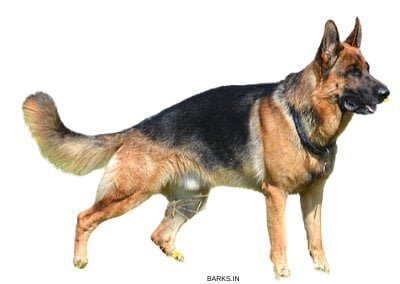
If you live in India and are fascinated by German Shepherds and looking for an India specific ownership guide, then you are in the right place. In this post, we address India specific German Shepherd ownership questions such as.
- Can German Shepherds survive in India?
- What is the cost of owning a German Shepherd in India?
- Where can I buy a German Shepherd?
- What should I know before getting a German Shepherd in India?
- Can German Shepherds live in apartments?
Despite German Shepherds being one of the most popular dog breeds in India, there is little reliable information about them in India. 99% of the information that you find on the internet does not apply to India.
We at barks.in have extensive firsthand experience in owing, caring for, and breeding top-quality German Shepherds in India. We have also included practical tips for maintaining German Shepherds during hot Indian summer months.
We encourage our readers to read our post thoroughly as it includes detailed information about every aspect of owning, maintaining, and caring for German Shepherds in India.
German Shepherd dog quick facts
| German Shepherd Dog | Facts |
|---|---|
| Country of origin | Germany |
| Names | Alsatian wolf dog Berger Allemand Deutscher Schaferhund GSD German Shepherd |
| Type | Herding |
| Size | Large; Male: 40-45 kg Female: 35-40 kg |
| AKC classification | Herding |
| Coat colors | Tan with black saddle Sable Solid black Bi-color White |
| Temperament | Active dogs and are self assured |
| Notable features | Wolf-like Extreme intelligence Sloping topline |
| Shedding | Excessive and constant |
| Grooming | Daily grooming |
| Exercise needs | Daily walk for 2 hours |
| Trainability | Easy to train |
| Health issues | Skin allergy, Hip dysplasia Bloat, Epilepsy Diabetes, and Degenerative disc disease |
| Temperature tolerance | Excellent below 30C Needs help above 30C |
| Recommended diet | High-protein diet |
| Purpose | Police dog, Military dog Sniffer dog, Search and rescue dog Disability assistance dog Detection dog |
German Shepherds in India
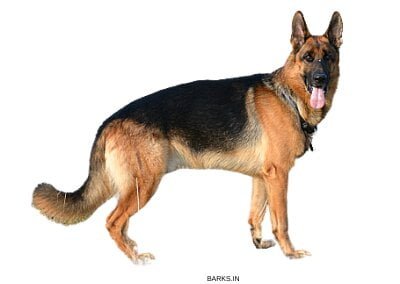
Before we dwell into details of German Shepherd ownership, it is essential to understand German Shepherds in India. In India, there are several misconceptions about this dog. As owners and fanciers of German Sheperd dog in India, we must distinguish facts from fiction.
Kennel Club of India (KCI) is the register of pedigree dogs in India. The German Shepherd Club of India is a chapter under the KCI that maintains the pedigree of German Shepherd dogs and conducts dog shows.
German Shepherd versus Alsatian
German Shepherd or GSD, also called the Alsatian refer to the same breed of dog. The name Alsatian was due to the British influence in India.
The United Kennel Club (UKC) of Britain used Alsatian as the official name for this breed before World War II. Which led some Indians to erroneously assume German Shepherd and Alsatian are two distinct dog breeds. German Shepherd and Alsatian refer to the same breed of dog.
German Shepherd Traits

German Shepherd is a large breed of working dogs from Germany. As their name implies, this is a highly intelligent shepherd dog used for herding sheep and other livestock.
Wolf-like appearance, extreme intelligence (almost human-like), intensely loyal, loving and affectionate, and active are the hallmarks of the German Shepherd dog.
The German Shepherd is a large breed of dog, with males weighing 40kg to 45kg and females 35kg to 40kg. The male German Shepherd is more masculine in appearance, with a large head, bigger frame, and a muscular body.
The female German Shepherd, on the other hand, is more feminine. Their head is long and slender than a male, and are smaller than the male German Shepherd.
German Shepherd variants in India
In India, we see the following variants of the German Shepherd dog.
Show line German Shepherd

The show line GSD is the most common and most popular GSD in India. Show line dogs have a distinctive sloping top line. Breeders in India also refer to the sloping top line as “angulation.” The show line GSDs have two coat types.
- Bush coat/long coat German Shepherd – People use names like the double bush coat and bush coat to denote German Shepherds that have long hair.
- Standard coat/Short coat/Show coat German Shepherd – The standard coat GSD has medium-sized hair.
Working line German Shepherd
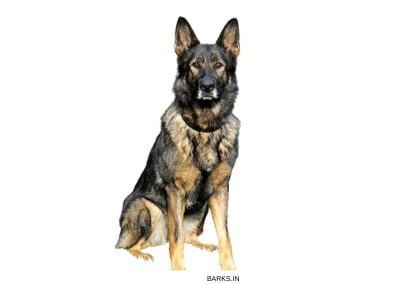
Only a handful of breeders own working line GSDs in India. These dogs have a standard coat and are rare. The notable difference between the show line and the working line GSD is the top line. The show line dogs have a sloping topline, whereas the working line dogs don’t. The working line dogs are slender, heavy boned, and appear athletic compared to the show line dogs.
Not all GSDs that have a flat topline are working lines. The chances of you finding a good working line GSD in India are slim to none. Don’t be fooled by fraudsters selling crossbred and impure show line GSDs as working line dogs.
German Shepherd coat colors in India
There is much misconception in India about German Shepherd coat-types and acceptable colors. The Kennel Club of India follows the United Kennel Club and the American Kennel Club (AKC) standards for German Shepherds in India. The following colors are the accepted standard coat colors for the GSD in India.
Saddle black and tan coat with a black mask

This color variant is the most common GSD in India. The GSDs in India come in different shades of tan. The dark shade of tan is the most preferred in India. Some breeders call the dark tan as the red German Shepherd.
Germans Shepherd with black mask and sable coat
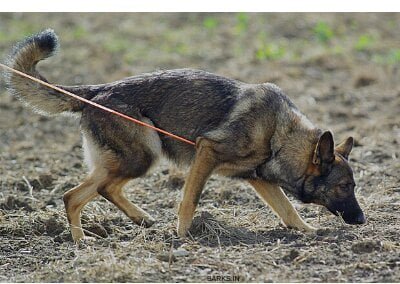
Sable German Shepherds are rare in India. Typically (but not always), the working line GSDs have a sable coat.
Black German Shepherds
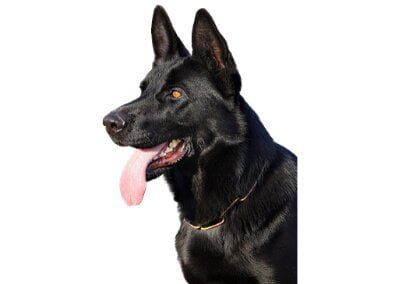
Solid black German Shepherds are rare in India. Only a handful of dogs with this coat color live in India today.
Bi-color military working German Shepherd
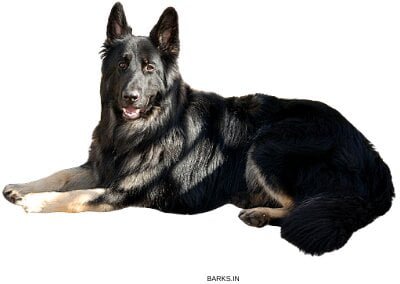
The Bi-color military dog is also rare in India. We haven’t come across any breeders or anyone who has this color variant in India.
German Shepherd with white markings

Some German Shepherd puppies are born with white markings on their chest, tips of their feet, and the tip of their tail. These white patches disappear even as the puppy matures.
In rare cases, white markings remain with the puppy until adulthood. Minor patches of white on a German Shepherd while it is a fault in the show ring, but it does not denote crossbreeding or impurity.
White German Shepherd/ Swiss Shepherd
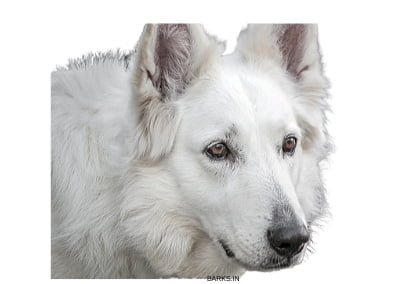
The Swiss Shepherd or the White German Shepherd is a GSD with a pure white coat. International Kennel Clubs do not recognize this dog. Hence, there are no standards established for the Swiss Shepherd.
In India, we have come across a few breeders who claim to own a white GSD. In our research, we found them to be crossbred GSDs or large size Indian Spitz.
Indian German Shepherd Temperament
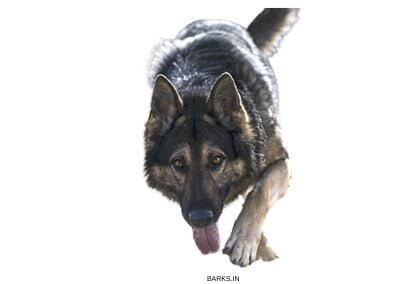
Most people who own German Shepherds in India love their GSDs because of their temperament. German Shepherds have a delightful and exciting character. You will hardly see them lazing around. These dogs are high energy, active, and playful dogs.
By nature, German Shepherds are wary of strangers, which makes them an excellent guard dog. A GSD bonds intimately with its human family and is protective.
GSDs need socialization to prevent aggression towards unfamiliar people and pets. These dogs need and earn for human contact and feel miserable when left alone.
GSDs are excellent with kids. Remember, you will need to supervise kids with dogs. Your new GSD puppy will be active and will have sharp teeth, which can result in a painful play bite.
The remarkable intelligence of German Shepherd dog
Most people fall in love with a German Shepherd due to its outstanding, human-like intelligence. German Shepherd is the third most intelligent dog in the world.
Out of all the dogs that we cherished, German Shepherds, in our estimation, are the most intelligent and easily the most intelligent dog in India.
Exercise requirements of a GSD

German Shepherd is a working dog. In India, people still call them the police dog. GSD excels in several roles such as disability assistance, guard dog, protection dog, herding dog, military dog, and search & rescue dog.
GSDs need daily exercise to be healthy. When left alone and under-exercised, they turn to aggression. Bored GSDs can become destructive by chewing anything that fits in their mouth.
If you have a large property or an individual villa, get a pair of GSDs instead of one. Owing two GSDs is double the reward, and the dogs keep each other excellent company.
Common GSD health issues in India
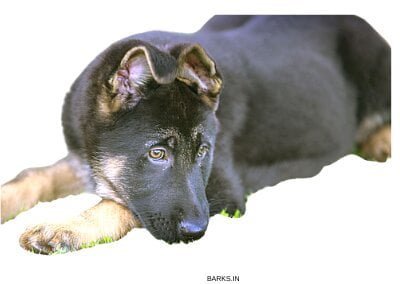
In India, a German Shepherd is a high maintenance dog. Unlike the native Indian dog breeds, GSDs require specialized care to adapt to India. GSD is a healthy dog, but due to its double coat and relatively less heat tolerance, they require additional care. Below are the most common health issues in GSDs in India.
- Mange/Skin issues – Microscopic mites that live on the dog’s fur causes Mange. German Shepherds with their dense double coat are prone to mite infestations. Mange causes hair loss and itching.
- Food Allergies – Spicy Indian food does not always digest well. The biryani that you love so much is not suitable for your German Shepherd. Food allergies cause loose stools and vomiting.
- Hip Dysplasia – The show line German Shepherds suffer greatly from Hip dysplasia. The sloping topline of the German Shepherd causes stress in the spine. Even as the dog ages, the condition worsens. Always buy your GSD from a reputable breeder, insist on reviewing KCI certification for both parents.
- Others – Bloat, Elbow dysplasia, Epilepsy, Hemophilia, Diabetes, Cataracts, and Degenerative Disc Disease are a few other ailments that affect GSD.
Indian home remedies for GSD’s health issues
Below are our home remedies that we rely on to treat our dogs. We recommend that you read through our post on home remedies for dogs to get a complete picture.
- Coconut oil – Coconut oil is one of the best oils in the world. Mix one teaspoon of coconut oil in your dog’s meal for excellent health. You can also apply coconut oil on their skin to reduce itchiness.
- Aleo Vera – Aleo Vera does wonders for a German Shepherd’s skin. Apply Aleo Vera directly on the hair to minimize itchiness and for overall skin health.
- Yogurt – Yogurt can heal a bad tummy and rehydrate dogs during hot summer days.
German Shepherd essentials in India
| Item | Age group | Amazon Link |
|---|---|---|
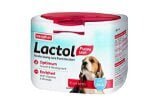 Puppy milk | 0 to 2 months | Buy now |
 RC Starter | < 3 months | Buy now |
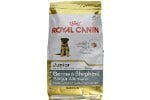 RC Junior Dry | 3 to 8 months | Buy now |
 RC Junior Wet | 3 to 8 months | Buy now |
 RC Adult | > 8 months | Buy now |
 Treats | All ages | Buy now |
 Collar | All ages | Buy now |
 Leash | All ages | Buy now |
 Puppy shampoo | < 6 months | Buy now |
 Adult shampoo | > 6 months | Buy now |
 Ticks and Flea | All ages | Buy now |
 Puppy dewormer | 0 to 6 months | Buy now |
 Adult dewormer | > 6 months | Buy now |
 Brush | > 3 months | Buy now |
 Injury spray | > 6 months | Buy now |
 Hair trimmer | > 6 months | Buy now |
 Bed | All ages | Buy now |
 Nail clipper | All ages | Buy now |
 Spine and Elbow | > 6 months | Buy now |
Caring for a German Shepherd in India
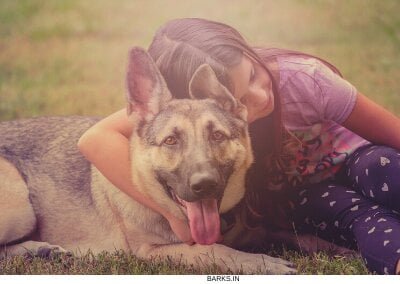
We wrote this section, keeping in mind the unique Indian context. We wanted to share our practical knowledge and experience in maintaining a German Shepherd in hot and humid Indian conditions.
Remember, German Shepherds, are from Germany and thrive in colder conditions. The recommended temperature for a GSD is 30C or lower. Indian summers are much hotter and GSDs because of their beautiful double coat needs additional care.
Can a German Shepherd survive in India?
The good news is GSD’s can thrive in India. German Shepherd dog that we see in India adapts well to our hot and humid conditions with some help.
Tips for GSD maintenance during hot Indian summer
- We recommend keeping your GSD indoors or in a cool place during the hot summer months. Ensure that your dogs have access to clean water all the time.
- We also recommend that you AVOID feeding your GSD chicken during hot summer months. Feeding them chicken increases their hair fall and, in some cases, can cause skin allergies.
- Change your feeding schedule so that you feed your adult dog early in the morning and late evening. Your puppy will need more than two meals per day.
- Feed them cold Yogurt as it helps stay hydrated and also helps their digestion.
- You can also sprinkle cold water where your dogs sleep. German Shepherds love water, and your dog will appreciate a wet towel or a cool place to sleep.
- In India, GSDs shed during hot summer months. Don’t panic when you see your dog lose their fur. It will grow back.
- It is also natural for GSDs to sleep most of their day during hot summer days. It is the dog’s way of avoiding heat stress.
- Avoid intense exercises during the hot summer months. Ensure your dog is not stressed. A walk after sundown should be sufficient.
- Avoid excessive bathing of your dog. Most Indians of guilty of over bathing their GSDs during hot summer days. Over bathing will result in poor skin and hair health. Please avoid it.
The recommended diet for German Shepherd in India

German Shepherds are large and active dogs. These dogs require high quality, protein-rich food for them to reach full potential. We recommend well-cooked homemade dog food or a commercially made dog food.
We don’t recommend a BARF diet or feeding your German Shepherd raw or under-cooked meat in India. A BARF diet is natural for dogs. Studies show that dogs on raw food are healthy. However, if you look at the Indian context, it is better to avoid feeding raw food.
If you visit any meat shop in India, you will notice that meat isn’t hygienically processed. For this reason, we recommend that your German Shepherd is better off on a cooked diet.
Diet for a German Shepherd adult dog in India
We recommend feeding your adult dog twice a day with a high-quality adult dog food. Ensure that your dog food has a minimum of 26% protein. You can find specially formulated dry dog food for a German Shepherd adult dog.
If you are planning to feed your dog homemade dog food, ensure that it has veggies and meat. We recommend red meat over chicken for your German Shepherd.
Diet for a German Shepherd puppy in India
A German Shepherd puppy, on the other hand, needs food much more frequently and in small quantities. A GSD puppy is a bundle of energy and requires frequent high-quality small meals during its development stage.
For a GSD puppy, we recommend 5 to 6 meals daily until it reaches four months. For puppies between four and twelve months, 3 to 4 meals per day should fulfill their energy needs. Puppies are picky eaters and will not eat the same food. You need to learn to mix their diet.
The following are an excellent choice for your German Shepherd.
- One boiled egg per day
- Soup made from mutton/beef bones
- Cooked mutton/beef bones to chew
- Baby food such as Cerelac if your puppy is less than 45 days old
- Boiled carrots and other veggies
We recommend that you read through our best dog food in India post. It includes comprehensive information about dog food and a review of popular dog food brands in India.
Grooming a German Shepherd

German Shepherd shed their hair regularly. India’s hot and humid weather causes stress to the dogs, which in turn results in shedding. Both long and medium coat German Shepherds have two layers of fur.
The outer coat is long, coarse, and grain to the touch. The inner layer of fur is dense, soft, and water-resistant. Remember, if you are looking for a GSD, it takes effort and time to maintain their hair in good condition.
Daily grooming is mandatory for this breed. Grooming also helps you to keep an eye on minor nicks and scratches. Without grooming, GSDs shedding will become unmanageable.
Also, remember, German Shepherds “blow” their coat twice each year. In other words, they shed their coat entirely. Don’t worry; your dog won’t become hairless. During this time, you will notice excessive hair fall. German Shepherd bitches blow their coat after giving birth due to the stress that they endure.
Tips for bathing German Shepherd in India
German Shepherds love water. If you owned them, you would know that even GSD puppies enjoy playing in the water. Most novice GSD owners make the mistake of bathing their dogs frequently. Frequent bathing washes essential oil that the dog skin secrets. It results in dry-flaky skin and excessive hair fall.
The recommended bathing frequency considering Indian conditions for a German Shepherd is 4 to 5 weeks. If your dog gets dirty, you can always use a wet towel to wipe clean the dirt.
Using human shampoo on dogs is another frequent mistake made by novice dog owners in India. Never use a shampoo made for people on dogs. Dog’s hair and skin are different from ours.
German Shepherd puppy care and essentials

Before you decide on bringing home a German Shepherd puppy, it is crucial to understand the basics of puppy care. German Shepherd puppies are active, energetic, and are keen learners. A GSD puppy will bring happiness to your entire family if you take proper care.
Puppy essential #1 – Place to sleep/home
Dogs are like people; they need a safe and comfortable place for them to sleep. Puppies that are a few months old will feel lonely and insecure when it comes to your home for the first time. It is vital to select a place where the puppy can rest, hide from all the noise, and feel safe.
Keeping the puppy close to you helps them feel safe and will give you and your family to bond with the puppy. Another advantage of keeping the puppy indoors is potty training. Because the puppy is indoors, you can monitor the puppy closely and take it outside for potty.
Puppy essential #2 – Food
The first six months of a German Shepherd puppy is the most crucial stage in its development. High-quality food, protein-rich food ensure proper growth and nourishment for the puppy. We don’t recommend any supplements for a healthy puppy.
Feeding a high-quality puppy food should provide all the nutrients and vitamins that a puppy needs. Most Indian’s are guilty of feeding calcium supplements for their dogs. Always consult with your vet before you feed any supplements to your puppy.
Puppy essential #3 – Play
Play is a crucial part of a puppy’s development. Play helps the puppy build critical social skills, through play, a puppy learns its place in its pack, and play is also an excellent form of exercise.
The only way a dog feels its world is through its mouth. Remember, German Shepherd puppies have sharp milk teeth and can break your skin during play. GSD puppies also love to bite your chase after you and bite your feet. These dogs have high prey-drive and enjoy chasing and biting anything that moves.
Several first time GSD owners find managing a puppy tiresome. Remember, this is a high-energy working dog. GSD puppies are not your average lap dog.
Puppy essential #4 – Training and socialization
German Shepherds grow to become large dogs. Hence, proper socialization and training are mandatory for these dogs. We recommend positive reinforcement training for GSDs.
Socialization is also essential for your dog. Introduce your puppy to friends and other household pets so that they can get accustomed to them.
Remember, GSD’s when not properly trained or socialized, are time bombs waiting to explode. GSDs have one of the most powerful jaws in the doggie world. Constant and consistent leadership is critical for a positive and beautiful relationship with your dog.
Puppy essential #5 – Veterinary care
All dogs in India require veterinary attention and regular vaccination. India’s sizeable stray dog population spreads diseases to non-native dogs, such as the German Shepherd, through indirect contact.
Puppies are prone to the deadly Parvovirus. Infected dogs “shed” the virus to surfaces that they come in contact with, and Parvovirus can survive outdoors for several months.
Don’t walk your GSD puppy outdoors until you complete the full course of Parvo vaccinations. Rabies is another serious threat to dogs and people in India. Be sure to get your puppy vaccinated for rabies.
Care for newborn GSD puppies

GSD’s typically have 6 to 11 pups in the litter. GSD’s are excellent mothers and take excellent care of their litter. However, even experienced mothers require assistance when it comes to nursing.
GSD’s are born blind and deaf. It takes about 10 to 14 days for a newborn pup to open its eyes and another week to make sense of what it sees. Hence, smaller puppies don’t get adequate nursing time as her larger siblings push her away.
Until the puppies become stronger and can find a nursing spot on their own, we recommend that you help smaller puppies to feed. Mother’s milk is the best for a puppy and should be the primary food source for the first few weeks.
After the initial two or three weeks, you can start a supplemental feed. Royal Canin’s Maxi Starter is an excellent choice. You can soak it in lukewarm water of 30mins, mash it and feed it using a feeding bottle or spoon-feed it to your puppies.
Breeding a German Shepherd in India

Warning: Breeding GSD is not for everyone. The foremost objective for breeding any dog breed should be to enhance or protect the breed. We are 100% against anyone who breeds GSDs for profit and does not care about the breed’s overall well-being.
Breeding for greed and profit has damaged the quality of GSDs in India. GSDs are a beautiful breed and should be for everyone’s enjoyment. Sadly, there are more breeders of profit than breeders of quality.
Essential tips for breeding German Shepherds in India
- The stud (male dog) and bitch (female dog) should have completed two years of age. Don’t breed dogs younger than two years of age.
- Your breeding pair should be healthy, with no illnesses or congenital disabilities (birth-defects).
- Plan for one litter each year and not two. Breeding your dogs often will result in poor health. In some cases, the bitch might abandon its litter.
- Consult a veterinarian and have both the dogs checked for illnesses.
- Never breed a dog with no known pedigree. Ensure both dogs have the Kennel Club of India certification.
- Never choose a male or a female just because it looks beautiful. Your dogs should conform to the United Kennel Club or the American Kennel Club standards for a GSD.
- A pregnant and nursing dog requires specialized nutrition to support her litter.
- A pregnant dog needs a cool, comfortable, and distraction-free place to give birth and nurse her puppies. If you live in an apartment, don’t plan to breed.
- You will need to dedicate a month since the time puppies are born. We have personal experience in looking after our litter, and we can tell you it is stressful and will require 100% of your time.
- Plan to employ a helper who can help during the first month.
Registering your German Shepherd litter with KCI
Kennel Club of India has a simple and easy registration process to register your litter. You need to download the puppy registration form from the KCI website, fill the form, pay the registration fees, and send it to the KCI office.
Upon receipt of the form, a KCI representative will visit your home to verify the litter. Post verification, KCI takes somewhere between 2 to 6 months to issue the KCI certificates for your litter.
Selling the puppies
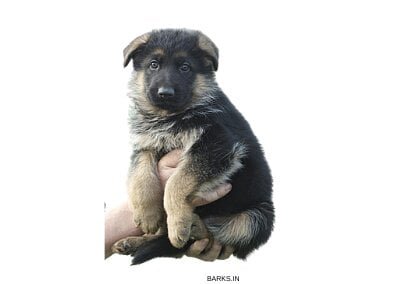
You can start looking for a new home for your puppies after 45 days. Remember to vaccinate and deworm puppies before sending them to their new home.
You can advertise your litter in dogsindia.com, Facebook, and other online platforms. Let your local pet shop, friends, and family know about the litter. GSDs are popular dogs in India, depending on the city where you live in you should be able to find new homes for your puppies in a month or two.
Fixing a price for your litter
As a breeder of German Shepherd in India, we know the cost, time, and effort incurred by a breeder. If you are a first-time breeder with little reputation, you will not be able to sell your puppies for more than INR 20k. This fact is assuming that you have KCI registration for your puppies.
Please read our post on dog prices in India. It has useful information about buying and selling dogs in India. You can use the information provided in our post to set a price for your litter.
If your dogs are show dogs, you will be able to attract high-end buyers who will be willing to pay a premium. A lot depends on the reputation of your dogs.
Most Indian buyers prefer a male pup. Male pups cost more than females due to demand. Finding a home for a female puppy will take longer, and you need to be patient.
Remember, the cost of owning, maintaining, and breeding German Shepherds in India will exceed any income that you get from breeding them. Don’t fall into the trap, thinking you can sell your puppies for a premium without building a reputation. Building a reputation will cost you more money. The bottom line is that breeding high-quality GSDs is not a profitable venture if you do it on a small scale.
We also don’t recommend selling your pups to anyone who pays money. You should be looking to finding a home for your puppies than selling them.
GSD buyers guide in India

Living with a German Shepherd is a delightful experience. They are affectionate, loyal, and protective dogs. German Shepherds are a popular breed in India, and people are willing to pay a premium to get one.
High demand often results in poor quality. Breeders of profit and puppy mills are keen on profits rather than on the health of the dog. The most important thing that you need before you buy a German Shepherd in India is patience.
The average lifespan for a German Shepherd in India is 9 to 12 years. Never rush into a decision because you get a better offer or a cheaper deal.
There is no cheap, high-quality German Shepherd. Don’t fall for someone who is willing to sell you a GSD for less than 8k and claims his dog to be high-quality. Breeding and maintaining GSDs is expensive, and no breeder who cares about his dogs will sell his dog for cheap.
Prerequisites for owning a German Shepherd in India
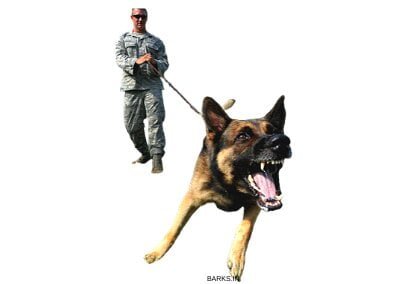
The following are crucial prerequisites for owning a German Shepherd in India.
Prior experience with dogs
The most vital precondition is prior experience with dogs. If you are a first-time dog owner, then GSD is not the right dog for you. You will find GSDs unmanageable, and when they grow up, you will have an uncontrollable large dog. Please don’t fall for the “teddy bear-like” cute looks of a GSD puppy.
Time, space, and money
German Shepherds are from Germany and are a non-native breed of dog. These dogs are high-energy, high prey-drive herding dogs that live in a much cold climate than ours.
All of these factors mean you need time to take care of them, space for them to play and exercise, and money for food, vet, and other expenses. A German Shepherd is a high maintenance dog.
They are a delight to people who love them and have experience with dogs. However, first-time dog owners will find a German Shepherd too much to handle.
A dog-loving family
Don’t get a GSD if you don’t have the full support of your family. GSDs are not toy dogs that people don’t mind having indoors. A full-grown male German Shepherd will weigh over 35kg and has one of the most powerful jaws among all domestic dog breeds.
A German Shepherd can easily push a child or an older person down. GSD hair can also cause allergies to people. Only a dog-loving family can provide the care that these dogs need.
Choosing the right breeder
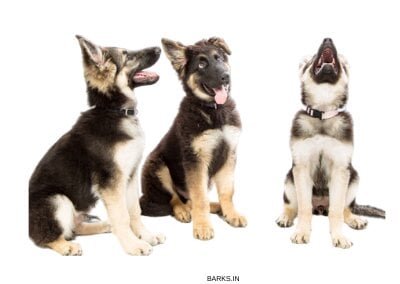
Getting your puppy directly from the right breeder has several benefits. We recommend that you get your GSD puppy directly from a breeder. Preferably from a breeder who has both parent dogs. Never buy a GSD from a pet shop or a broker. A good broker will take you to the breeder directly.
Guidelines for choosing the right breeder
- Good breeders don’t sell their puppies to anyone willing to pay money. He/she will evaluate you and sell if and only if he/she is comfortable.
- A good GSD breeder is knowledgable about German Shepherds in general. He/she should be able to answer any questions that you might have about the breed.
- A good breeder is open and will willingly share information about their dogs and their pedigree and health. Most good breeders will provide reliable references who can vouch for the quality of their dogs.
- A good breeder generally has other sources of income. Most of them have GSDs because they love them and not because they can make money out of them.
- A good breeder will not haggle. They generally have a fixed price and are confident about the quality of their dogs.
Choosing the right puppy

Most German Shepherd breeders will select a puppy for you. After your initial discussion with them, they can accurately match a puppy to you. When we sell our GSD puppies, we match the buyer’s experience with our puppy’s temperament.
After you choose the right breeder, we recommend that you leave the choice of selecting the right puppy to the breeder. They know their dogs enough to make the right choice for you.
Any puppy from the right breeder will be worth your money. Most Indians incorrectly assume the first few pups of a litter are the best. The truth is, no one can accurately determine how a puppy will look or behave when it matures. Sometimes it is the smallest and the weakest of a litter that turns out to be a champion.
Typical pitfalls to avoid
- Never get a GSD from a pet shop or a broker who cannot take you to the breeder.
- Never buy from a breeder of profit whose sole aim is profit.
- Quality comes at a cost. If someone is quoting less than an average price for a GSD, stay away.
- Don’t fall into the KCI certificate trap. People forge KCI certificates or use certificates from a different litter.
- Never pay anyone online who promises to ship the puppy to you. Choose a breeder in your state or city whom you can visit.
The total cost of ownership – German Shepherd in India
| Item | Cost/month | Annual cost |
|---|---|---|
| Puppy cost* (not included in total) | ₹15,000 - ₹40,000 | |
| Food | ₹6,500.00 | ₹78,000 |
| Health | ₹2,000.00 | ₹24,000.00 |
| Other | ₹2,500.00 | ₹30,000.00 |
| Total cost | ₹1,32,000.00 | |
German Shepherds are a popular breed in India. Being a non-native dog, the cost of ownership of a German Shepherd in India is exponentially higher than native Indian dog breeds. We hope this section will help you determine your likely annual expense.
The following are significant cost factors that one should consider while choosing a German Shepherd.
Puppy cost
Most GSD fanciers only look at the cost of the puppy and tend to forget all others when making their decision. GSDs are expensive dogs to own, don’t merely look at the puppy cost, and make your decision.
Show quality GSD versus Pet quality GSD
A show quality German Shepherd dog is the one that meets or exceeds all its breed standards. Show quality pups are expensive. If you don’t plan to compete in shows or dog agility trials, you don’t need one.
A pet-quality puppy has some minor faults and may not perform well in the show. These pups cost less and are an excellent choice for a home.
Vet cost
Vet cost is generally high for a German Shepherd. These dogs are not as resistant to canine diseases as native dogs. German Shepherds find Indian weather difficult. Expect to spend more for a GSD than other dog breeds.
Food cost
Food will be your single most significant expenditure for your dog. German Shepherds require a high-quality diet. Be prepared to pay a premium for your GSD.
Treats and other essentials price
In addition to food and vet expenses, you will need the following.
- Shampoos
- Treats
- Collar and leash
- Tick and flea medication
- Deworming tablets
- Toys
Pet insurance cost for a GSD
With veterinary treatments becoming expensive, pet insurance is becoming inevitable in India. If you are shelling out a premium for your puppy, we recommend that you get insurance for your dog to cover for recurring medical costs.
Interesting facts about GSDs in India
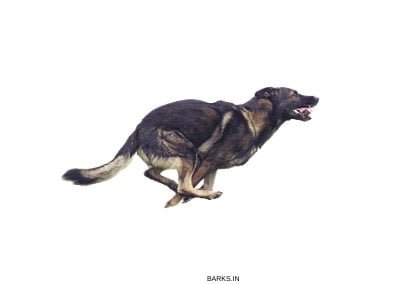
- The name Alsatian and German Shepherd refers to the same dog breed. Most Indians incorrectly believe them to be different dog breeds.
- Top Indian kennels have some of the finest German Shepherds in the world.
- German Shepherd is the second most popular dog breed in India.
- Indian armed forces, Indian forest department, and the Indian police departments employ German Shepherds in the ranks.
Frequently asked questions
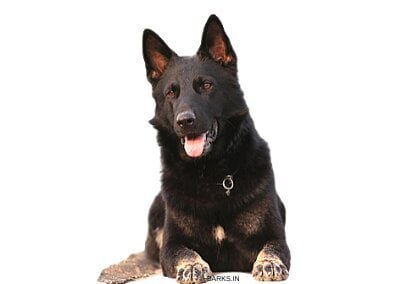
Can German Shepherds survive in India?
Yes, German Shepherds can survive in India’s hot and humid conditions. With additional care, such as having your dog indoors during hot summer days and feeding them a high-protein diet, GSDs can thrive in India.
What is the cost of owning a German Shepherd in India?
The total annual cost of owning a German Shepherd in India will be between INR 1.5 lakhs to 2 lakhs. German Shepherds are expensive to own and maintain.
Where can I buy a German Shepherd?
You should be able to find several GSD breeders in your locality. Always buy from a reputed. Read how to choose the right breeder in this post.
What should I know before getting a German Shepherd in India?
Read this post. We have included our experience in living and breeding German Shepherd in this extensive writeup. Feel free to ask your question in the comments section. We will help you with the information that you need.
Can German Shepherds live in apartments?
The answer is both yes and no. We don’t recommend keeping a large dog like a GSD in an apartment. However, several experienced dog owners live with a GSD comfortably in their apartment. If you are new to GSDs, then we don’t recommend it.
Conclusion: German Shepherd dog in India

We at barks.in strive to bring our readers the most relevant and contextual information. Indian context is unique, and you cannot apply experiences from breeders living outside India. We wanted our post to address the growing need for relevant information in the Indian context.
In conclusion, if you are looking to get a puppy that is not as expensive as a GSD, you can always get a Rajapalayam or other native Indian dog. They are much easier to maintain and thrive in Indian conditions.
GSDs are beautiful dogs. Living with a GSD will be a unique and rewarding experience. Please feel free to use the comments section to ask any questions that you might have. We will be happy to help.

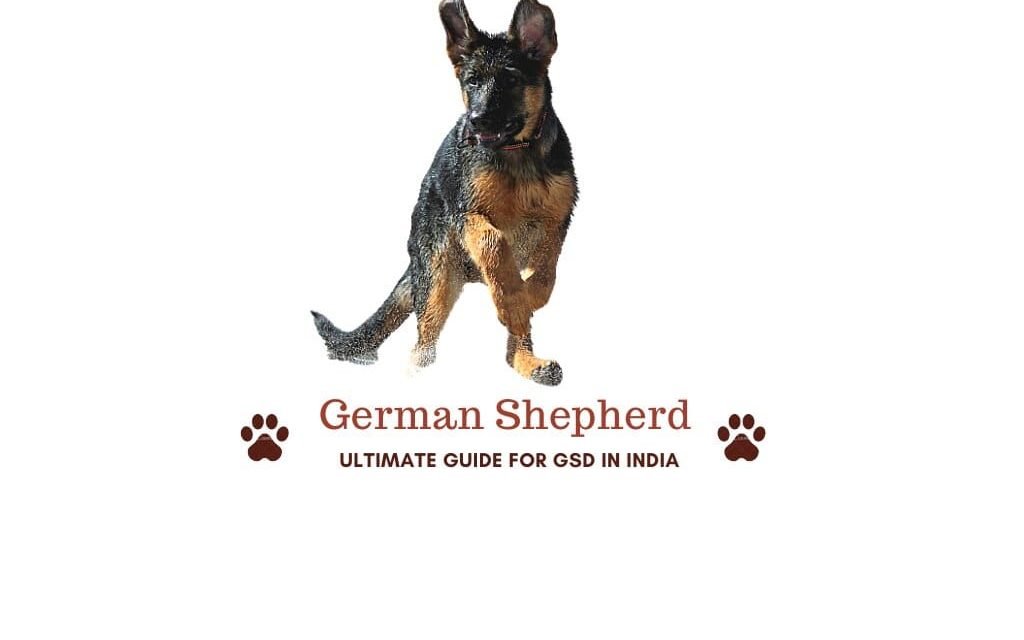
Excellent info
Thank you Barks.in team, I found the blog very helpful. I am a first time dog owner, and I am in dilemma which breed is suitable. Pease suggest some breeds for people like me, willing to maintain a dog.
Please check dogsindia.com for puppy postings. Please buy carefully, after proper verification of facts.
Thanks for your kind words
Hi,
There are several useful videos in Youtube that you can use. Having a large, powerful, unsocialized dog is trouble. You can also hire a dog trainer from your locality who should be able to help. Sorry, this is such a complex and wide topic. I am not able to assist without understanding the details.
Please correct the typos in your article! Very informative article other than the typos.
Sorry about the typos. We are working on updating all our pages. We will rectify them.
Thanks for reading our post.
Very Informative and helpful for first timer pet parents
Thank you for your kind words.